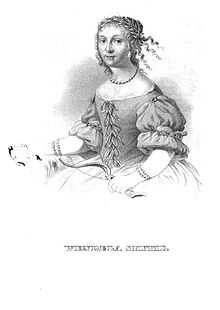Vendela Skytte

Vendela Skytte (or Wendela Skytte) (8 December 1608 – 18 August 1629) was a Swedish noblewoman, salonist and writer, poet and Lady of Letters. She has been used as an example in history to describe an ideal of a well educated woman.
Biography
Born to statesman and noble Johan Skytte and Maria Näf and married to Hans Kyle in May 1626. Her father gave his daughters the same education as his sons, and Vendela was a good student. She was accomplished in Greek, Latin, French and German and was a writer and a poet. She also corresponded in Latin. Her sister, Anna Skytte, was also admired for her learning.
Vendela Skytte was famed in her lifetime and after as a "learned lady" for her academic accomplices and her great learning, especially within languages, and was in history made into an example to describe well educated women. She has been called the most learned woman in her country before Christina of Sweden. She held a salon, where she took part in the debate of the day and was admired for her intelligence and knowledge and wit. She surrounded herself with scientists and artists and corresponded with the learned Catharina Bureaus. She was called: »Sexus et sæculi miraculum» ("The wonder of her time and her sex") by Georg Stiernhielm. According to the legend, Vendela conducted a religious debate with learned Catholic men in Braunsberg, a debate she won with her verbal ability; "by which she with superior skill in Latin questioned the most sacred ideals of the Catholic religion".
She died of the plague in Stralsund with her newborn child and left two daughters. She was brought to Sweden and buried in Uppsala. Her daughter Hillevi Kyle was also known as one of the most learned women in her country.
In the national Swedish portrait gallery of Gripsholm, which was opened in the 1820s, she was one of the first six women of the Swedish history who was given a portrait in the collection, alongside with Bridget of Sweden, Hedvig Charlotta Nordenflycht, Barbro Stigsdotter (Svinhufvud), Sophia Rosenhane and Sophia Elisabet Brenner.
Poem:
- "Alas, the may flys does not live longer
- They come and go with the sun.
- When the evening wind blows by your ear,
- In it is an image of my fates!
- So sad around my grave does the sylphid go
- and blow away my memory from time
- VITALIS"
See also
- Anna Åkerhjelm
- Hedvig Catharina Lilje
References
- http://runeberg.org/sqvinnor/0375.html
- http://runeberg.org/sbh/b0475.html
- Peter Englund, Ofredsår
- http://members.tripod.com/minata/bps_7_dec.html
- Women Latin Poets, Jane Stevenson
- A. L. Stjerneld (anonym), Gripsholmgalleriet (Stockholm 1833)
- Wilhelmina Stålberg, Anteckningar om svenska qvinnor (Notes on Swedish women)